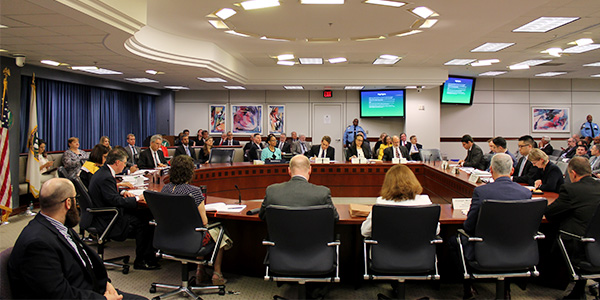By Michael Brooks
WASHINGTON — FERC on Thursday officially rescinded its controversial policy of allowing its Office of Enforcement to publicly disclose its investigations of possible misconduct and their subjects’ identities, ending a practice in place since 2011 (PL10-2-003).
The commission in 2009 authorized Enforcement to issue a Notice of Alleged Violations (NAV) after the subject of an investigation had the opportunity to respond to the office’s preliminary findings. Enforcement issued its first five NAVs on Jan. 25, 2011, four of which dealt with alleged market manipulation in ISO-NE’s Day-Ahead Load Response Program.
NAVs, however, were not like indictments: They were issued before Enforcement staff had finished their investigations and reached their conclusions in the case. Prior to 2011, the commission only disclosed the existence of an investigation and its subjects’ identities when it approved the issuance of an Order to Show Cause (OSC). NAVs also did not need to be approved by the commission itself; instead, they were issued after approval from the director of enforcement.

FERC holds its open meeting May 16. | © RTO Insider
FERC said it had “acknowledged the potential risk of reputational harm that might result from the issuance of a NAV but sought to strike a balance between protecting the confidentiality of investigations and promoting the public interest of heightened transparency.”
But the commission found that issuing NAVs generated little information for Enforcement’s investigations. And since the policy’s adoption, the commission found that other sources, such as data provided by RTOs under Order 760, have been more useful.
“Accordingly, the commission finds that the potential adverse consequences that NAVs pose for investigative subjects are no longer justified in light of the limited transparency NAVs have generated and the more effective, alternative means of adding transparency that the commission has developed since the NAV order.” These means include providing guidance through orders on settlement agreements, OSCs and orders assessing civil penalties.
At FERC’s open meeting Thursday, Commissioner Richard Glick said the policy had been unofficially ended for some time. Indeed, the last time Enforcement issued a NAV was in April 2018, the only one that year. (See FERC Investigation Shows PSEG Violated PJM Bidding Rules.) Prior to that, the office on average issued seven to eight per year.
While Glick acknowledged that NAVs had provided limited value, and joined in the unanimous vote to end the practice, he said that “the Office of Enforcement must act aggressively when there is evidence of market manipulation or other malfeasance that could adversely impact our jurisdictional markets, and I intend to review any future proposals affecting Enforcement’s role with that in mind.”
Asked by reporters after the meeting whether the commission was considering any other changes to Enforcement policies, Chairman Neil Chatterjee declined to comment.




